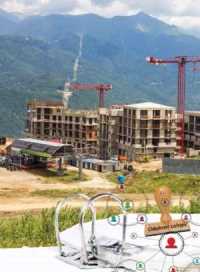
The Serbian construction industry has been heavily crisis-affected in past several years. The number of constructed facilities has been declining and realized investments have been significantly lower comparing to the previous period. Level of apartment construction in 2014 was half of the one from 2007/2008. Less than 10.000 housing units were completed in 2014, compared to 2000-2010 average of 30.000 units. The reasons have been numerous: from complicated regulations that had not been harmonized, missing bylaws, lengthy, unpredictable and complicated procedures with numerous steps, lack of transparency and access to information, to urban planning and ownership issues.
The construction permit procedure in Serbia is often used as a representative example of the public administration inefficiency. This is witnessed by the continuous decline of Serbia ranking in the World Bank Doing Business (DB) Report for Dealing with Construction Permit Indicator in this period: in DB 2012 – Serbia was ranked as 175th, in DB 2013 – as 179th, in DB 2014 – as 182nd, in DB 2015 – as 186th out of 189 World economies. To illustrate, from the location information to the registration of ownership in the Land Registry, it was necessary for the investor to go through 16 procedures in 264 days, while the total administrative costs were reaching 25.7% of the value of the construction (Source: Doing Business 2015 – Going Beyond Efficiency, Economy Profile, Serbia).
One of the causes of Serbia’s inefficient permitting system have been the lack of a simple system in which the investor communicates with one relevant authority (the Ministry, Province administration, local government), which holds full responsibility for overall construction permitting process. Instead, before 2015, investors had to “knock on numerous doors” to acquire needed conditions, consents and other documents being a precondition for obtaining construction related permits - from public utility companies, Cadaster offices to other holders of public authority. The competencies of republic and local public utility companies and other responsible institutions were fragmented, with the low level of their efficiency, low accountability for inefficiency, and without the proper monitoring system in place. This situation has produced bottlenecks as it allows public utility companies to abuse their legal authority. In addition, investors were exposed to different bureaucracies and overly complicated construction rules, which create opportunities for corruption.
Good construction regulations are of vital importance for public safety, but also for the development of the construction sector and the economy as a whole. According to a OECD study (OECD 2010. “Construction Industry.” OECD Journal: Competition Law and Policy 10 (1): 156–57.), the construction industry accounts on average for 6.5% of GDP in OECD economies. It is also the fact that, for many entrepreneurs, construction regulations are a critical factor when deciding where to establish their businesses.
Economies that score well on the ease of dealing with construction permits tend to have rigorous yet expeditious and transparent permitting processes. Thus, the comprehensive construction reform was more than needed to attract new investors and improve environment for existing businesses in Serbia. Improvement efforts resulted in amending the Law on Planning and Construction (LPC) on 8 December 2014, followed by the adoption of related bylaws.
The Law introduces One-Stop-Shop – OSS (i.e. Unified Procedure) with significant changes and new rules for competent authorities and investors, reduced number of procedures and steps and lower deadlines in construction permitting process. Multiple interactions of investors with various institutions have been, through the One-Stop-Shop, replaced with one focal point (the Ministry, Province administration or local government). The legislator’s idea was that the relevant competent authority (focal point), in the name and for the account of the investor, obtains ex officio the needed documents issued by the republic and local public enterprises, the Cadaster and other involved holders of public authority. As of January 1, 2016 e-permitting system has been introduced enabling submission of requests and issuance of permits through the centralized software to be used by all responsible parties: investors, local governments, public utility companies, Cadaster offices and other institutions.
Such innovative and complex system and new responsibilities present a significant challenge for all parties involved. Various drawbacks and obstacles can be foreseen, caused by insufficient expertize, lack of institutional capacities and resources, resistance to change, inappropriate hardware, as well as numerous uncertainties in implementation of the new Law and related bylaws.
In making the One-Stop-Shop implementation more efficient and effective, OPTIMUS provides support which includes:
- Trainings on e-permitting for public authorities (local governments, public utility companies, Cadaster offices and others), investors, design offices and other participants in the OSS;
- Direct technical assistance in e-permitting application for public authorities (local governments, public utility companies, Cadaster offices and others), investors, design offices and other participants in the OSS;
- Trainings on obligations, rules, procedures and implications introduced by the Law on Planning and Construction and related bylaws;
- Legal advice in implementing the Law on Planning and Construction and related bylaws;
- Full transparency of construction permits, procedures and regulations through the online Registry;
- Improvement of the legal framework and institutional mechanisms;
- Other types of support in relation to this subject matter.

Fully operational One-Stop-Shop will make immediate results, as follows:
- Reduced time and costs of construction permitting for investors;
- Simplified procedures and reduced steps in issuance process;
- Improved efficiency of competent public authorities in the construction permitting process;
- Reduced possibility of corruption;
- Increased accountability and improved system of monitoring of the work of relevant authorities.
Please find more about our results on the web pages of projects: "Improving business environment to increase investment in tourism infrastructure", "Trainings on One-Stop-Shop in the process of electronic issuance of construction permits" and "Improving Environment for Businesses at Local Level through Regulatory Reform."






